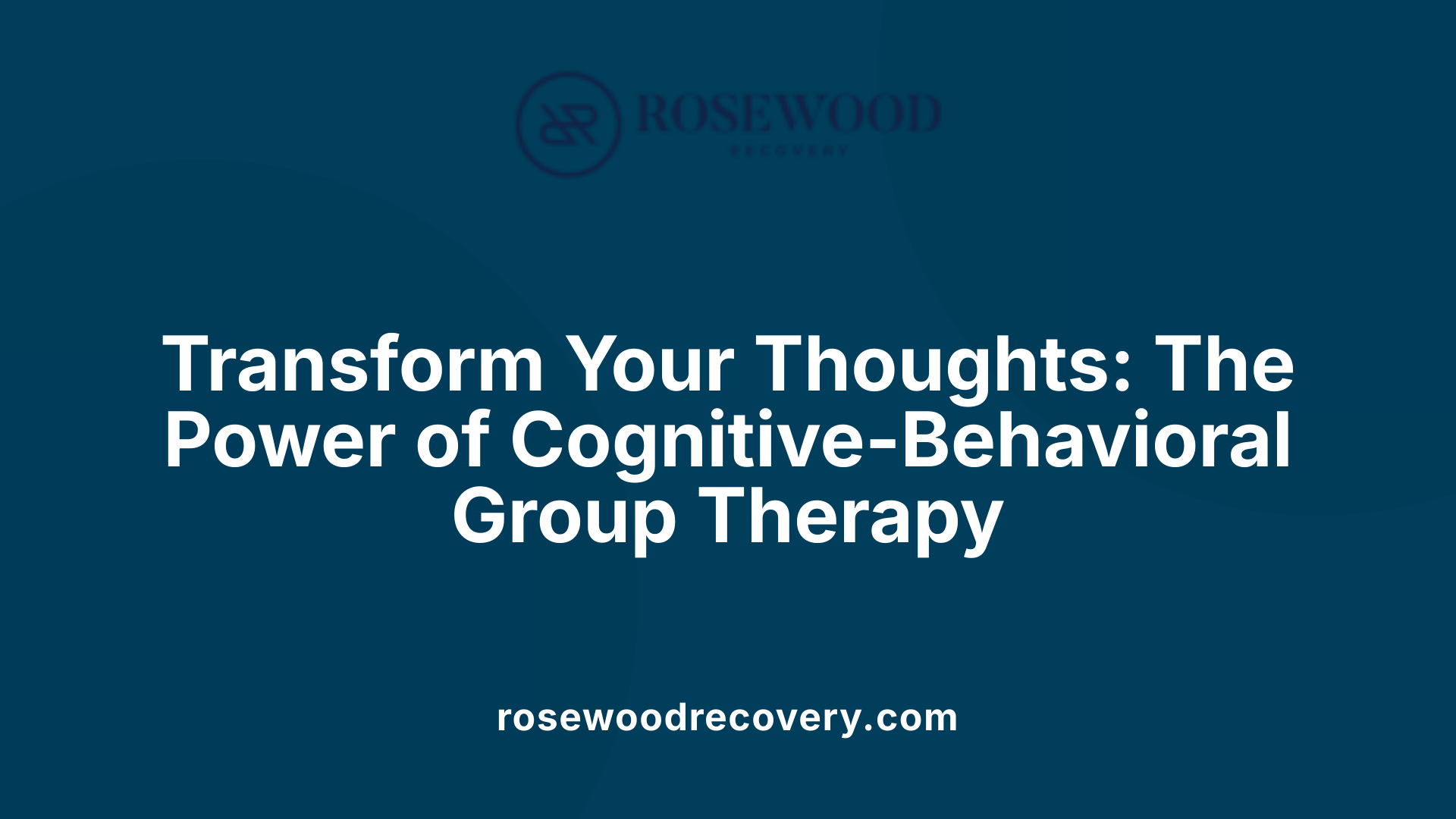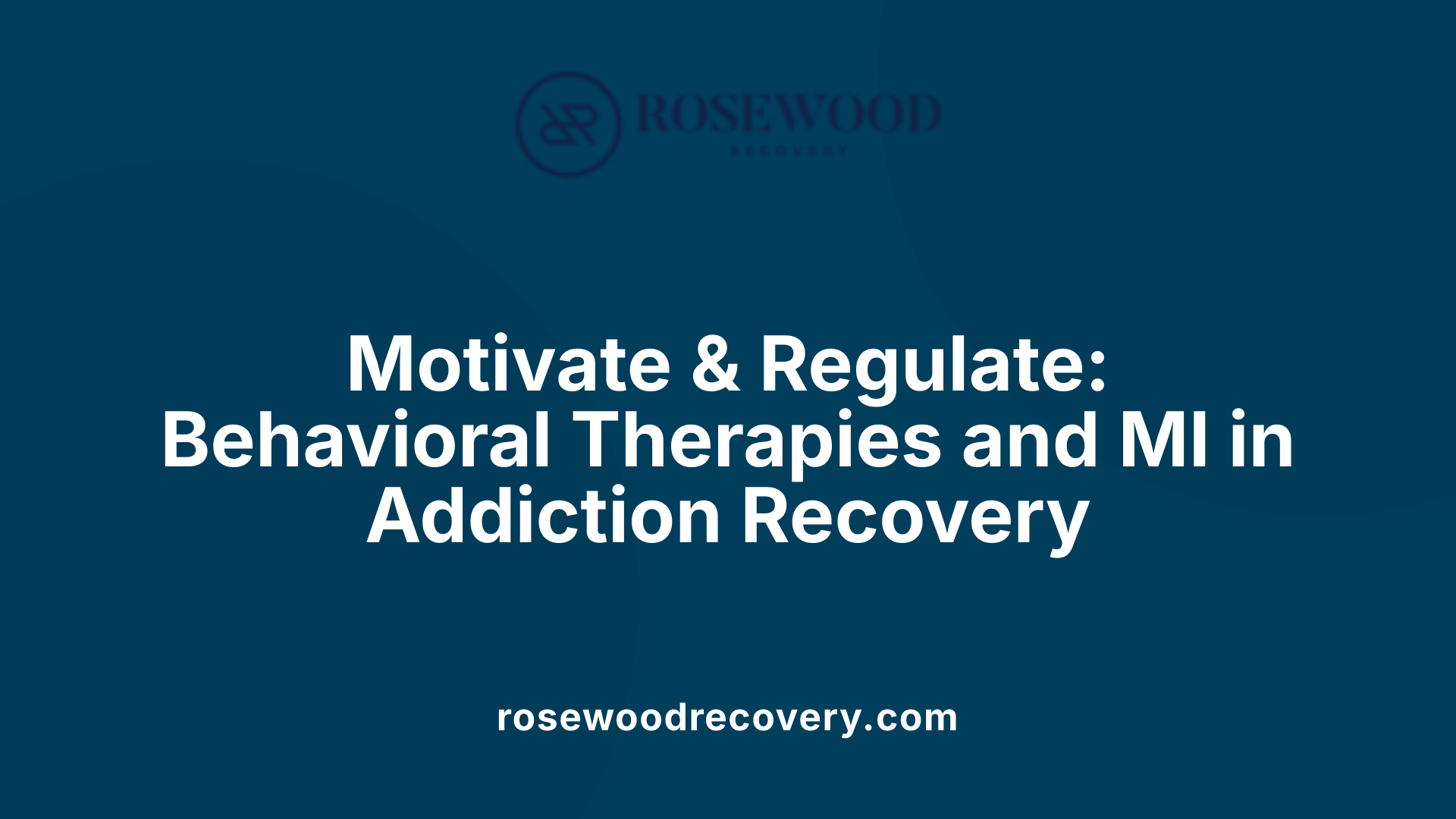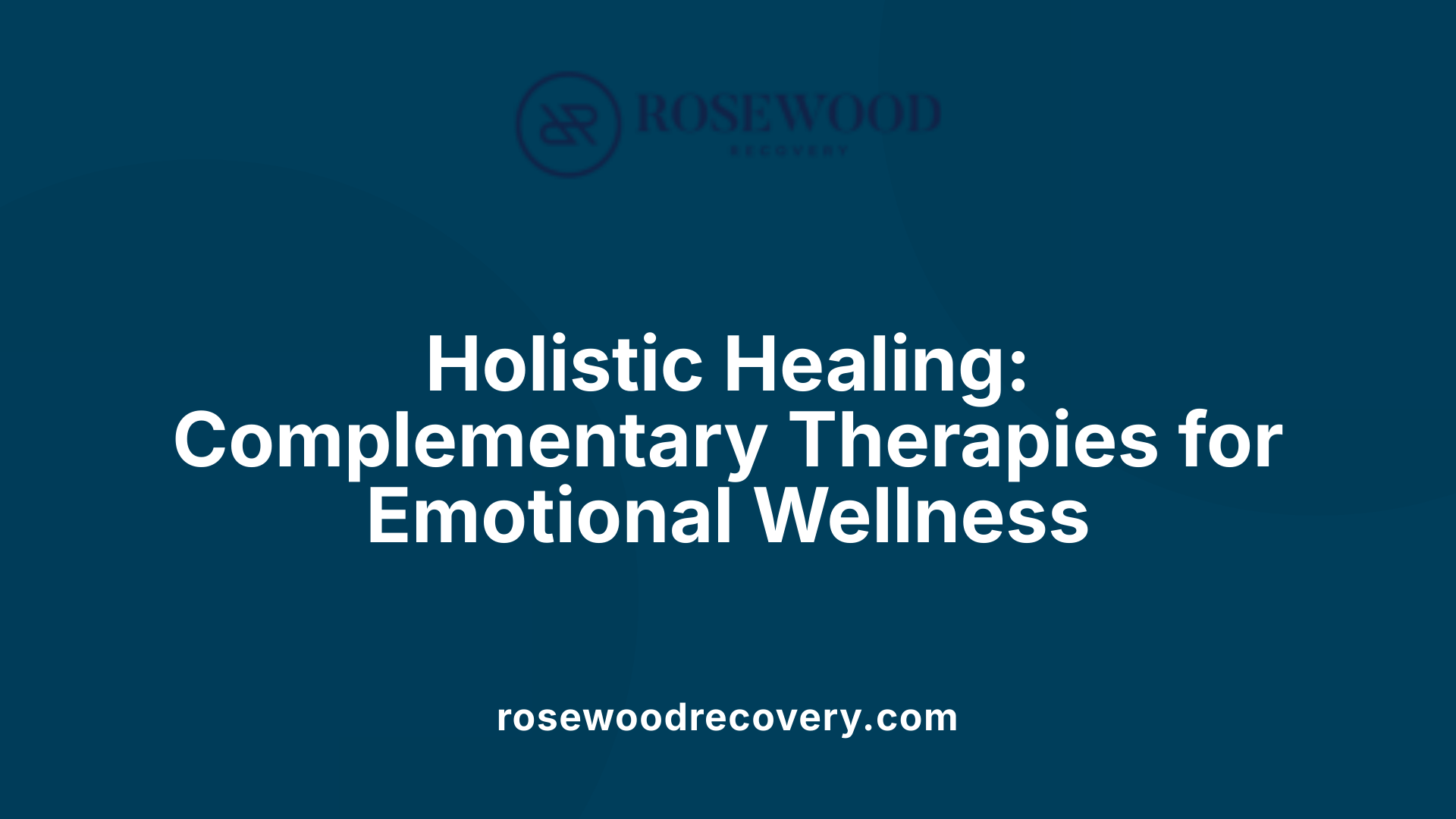Understanding Emotional Avoidance in Group Settings
Emotional avoidance is a common challenge in group therapy settings, particularly among individuals recovering from substance use disorders and co-occurring mental health issues. This article explores how comprehensive treatment services utilize various group therapy models and therapeutic approaches to help participants confront and work through emotional avoidance, promoting healthier coping mechanisms and sustained recovery.
The Role of Group Therapy in Addressing Emotional Avoidance
Why is group therapy important in addiction treatment?
Group therapy plays a crucial role in addiction treatment by offering a space where individuals feel understood and supported. It helps participants realize they are not alone in their struggles, reducing feelings of stigma and social isolation that often accompany substance use disorders. This communal support promotes engagement and fosters a sense of belonging, which strengthens commitment to recovery.
How does group therapy reduce isolation and stigma?
Isolation and stigma create significant barriers to recovery, often reinforcing emotional avoidance where individuals suppress difficult feelings related to their addiction. Group therapy counters this by building a community environment where members share experiences and provide mutual encouragement. This peer support helps normalize their experiences, lowers shame, and increases willingness to confront and manage emotional challenges.
What is emotional avoidance and why is it a barrier in recovery?
Emotional avoidance involves evading painful feelings or memories, which can undermine treatment progress. In substance abuse, avoiding emotions may lead to relapse or hinder the development of effective coping skills. Group therapy addresses emotional avoidance by facilitating open dialogue and interpersonal interactions, encouraging expression and processing of emotions in a safe setting.
What are comprehensive treatment services for substance abuse?
Comprehensive treatment services take a multidisciplinary approach, integrating medical care, psychological therapies, and social supports to promote recovery and prevent relapse. Group therapy is a vital component, providing emotional support, skill development, and strategies to manage triggers. It helps fill gaps in care by addressing emotional avoidance and fostering healthier coping mechanisms essential for sustained sobriety.
Through these functions, group therapy not only supports emotional healing but also enhances overall treatment outcomes by promoting active participation and resilience in individuals facing substance use challenges.
Understanding Emotional Avoidance and Its Impact in Group Settings
What is Emotional Avoidance?
Emotional avoidance refers to the tendency to evade or suppress uncomfortable feelings rather than confronting and processing them. In the context of substance use disorder (SUD) treatment, it often involves steering clear of painful emotions related to addiction, trauma, or interpersonal conflicts.
How Does Emotional Avoidance Manifest in Group Therapy?
In group therapy settings, emotional avoidance can present as silence, withdrawal, or reluctance to share personal struggles. Participants might change subjects when discussing sensitive topics, minimize their problems, or avoid eye contact. This behavior can hinder open communication and limit the individual’s engagement with therapeutic activities.
Effects on Interpersonal Relationships and Recovery Progress
Emotional avoidance in group therapy disrupts the development of trust and group cohesion, which are vital for a supportive recovery environment. Avoiding emotions reduces opportunities for catharsis and interpersonal learning, key mechanisms in therapy that foster insight and behavioral change. Consequently, clients may experience slower progress, increased feelings of isolation, and difficulty building healthy relationships. Addressing emotional avoidance through skilled facilitation and tailored interventions enhances emotional regulation, peer support, and ultimately strengthens commitment to sustained recovery.
Matching Group Therapy Models to Client Needs and Emotional Readiness

Overview of Main Group Therapy Models
Group therapy in substance abuse treatment includes various models designed to meet diverse client needs. These comprise psychoeducational groups, skills development groups, cognitive-behavioral/problem-solving groups, support groups, and interpersonal process groups. Psychoeducational groups increase awareness about substance abuse effects and motivate clients toward recovery. Skills development groups focus on teaching practical coping techniques such as anger management and managing high-risk situations. Cognitive-behavioral groups help alter negative thought patterns that contribute to addiction. Support groups offer emotional encouragement and build self-esteem, while interpersonal process groups work on improving unhealthy relationship patterns.
Importance of Matching Therapy to Stages of Change
Clients seeking substance abuse treatment present at different stages of change: precontemplation, contemplation, preparation, action, maintenance, and recurrence. Matching the group therapy model to these stages is critical for treatment effectiveness. For example, psychoeducational groups are well-suited for early stages like precontemplation and contemplation, providing foundational knowledge and motivation. Cognitive-behavioral groups and relapse prevention work well during action and maintenance stages by reinforcing coping skills and preventing relapse. Tailoring therapy to a client’s readiness maximizes engagement and supports sustainable recovery.
Tailoring Approaches to Overcome Emotional Avoidance
Clients often exhibit emotional avoidance, especially in the earlier phases of recovery, which can hinder engagement. Group therapists address this by selecting models that gradually encourage emotional processing—starting with psychoeducational and skills-building groups to foster safety and awareness, before progressing to interpersonal process groups that challenge and reshape relational dynamics. This stepped approach respects clients’ emotional readiness, helping them confront underlying issues without overwhelming distress. Effective group leadership adapts interventions flexibly, incorporating cultural competence and ongoing assessment of group dynamics to maintain supportive environments that promote emotional growth and resilience.
Psychoeducational Groups: Early Engagement and Awareness Building
What is the purpose of psychoeducational groups?
Psychoeducational groups in substance abuse treatment serve to inform clients about the multifaceted impact of addiction. These groups aim to increase awareness of how substance use affects behavior, medical health, and psychological well-being. By educating clients early in their treatment journey, psychoeducational groups foster motivation to engage actively in recovery.
How do these groups expand awareness of substance abuse consequences?
Participants learn about the consequences of substance abuse beyond immediate effects, covering long-term health risks, emotional challenges, and social implications. This awareness helps clients recognize the seriousness of their condition and the benefits of sustained abstinence. The information provided is based on evidence and designed to empower individuals with knowledge to make informed decisions about their recovery.
In what ways do psychoeducational groups support family understanding and motivation?
These groups often involve or provide resources for family members, helping them understand addiction as a medical and psychological disorder. Enhancing family awareness leads to stronger support networks and better communication, which are critical for client motivation and successful treatment outcomes. Families gain insights into how to support their loved ones through recovery stages like precontemplation and contemplation.
What types of addiction can comprehensive treatment services address?
Psychoeducational groups are part of comprehensive treatment services that address various substance use disorders, including alcohol, opioids, stimulants, cannabis, and tobacco. By educating clients about the effects and risks associated with these substances, these groups help prepare individuals for subsequent stages of treatment like skills development or cognitive-behavioral therapy.
This educational foundation is crucial for early client engagement and effective recovery management, creating a stepping stone for tailored interventions that correspond to each client’s stage in the change process.
Skills Development Groups: Building Practical Coping Strategies
Teaching Refusal Skills, Anger Management, and Problem-Solving
Skills development groups focus on equipping individuals recovering from substance abuse with essential practical skills. These groups teach refusal skills that empower clients to resist peer pressure and avoid substance use. Anger management techniques help participants recognize and regulate emotional responses that might otherwise lead to relapse. Additionally, problem-solving skills are developed to manage everyday challenges effectively without resorting to substance use.
Managing High-Risk Situations
A vital part of these groups involves preparing clients to handle high-risk situations. This includes identifying triggers and learning strategies to navigate potentially harmful environments or emotional states. By practicing coping mechanisms within a supportive group setting, participants gain confidence to maintain sobriety in the face of stress, cravings, or social pressures.
Developing Emotional Regulation Skills to Counter Avoidance
Emotional regulation is a key focus in skills development groups. Clients learn to confront and process difficult feelings rather than avoiding them through substance use. Teaching constructive emotional expression helps reduce emotional avoidance, a common barrier in recovery. This builds resilience and fosters healthier responses to stressors associated with both addiction and mental health challenges.
How Do Treatment Services Address Mental Health Issues Alongside Addiction?
Skills development groups enhance behavioral therapies by addressing emotional triggers and cravings that can intensify both addiction and co-occurring mental health disorders. They provide clients with tools such as stress reduction, anger control, and coping strategies that facilitate emotional regulation and decrease avoidance behaviors. This integrated approach supports comprehensive recovery by tackling underlying psychological patterns alongside substance use behaviors.
Cognitive-Behavioral Groups: Reshaping Maladaptive Thoughts

What Are CBT Principles in Group Settings?
Cognitive-Behavioral Therapy (CBT) in group formats leverages shared experiences to help participants identify and change harmful thought patterns that contribute to substance use. Group settings encourage observational learning, provide peer support, and allow members to practice new skills in a supportive environment guided by a trained therapist.
How Do Cognitive-Behavioral Groups Modify Thoughts and Beliefs That Sustain Addiction?
CBT groups focus on uncovering and reshaping maladaptive beliefs, attitudes, and perceptions fueling addiction. They teach clients to recognize distorted thinking, such as denial or rationalization, and replace these with constructive, realistic thoughts. Skills such as problem-solving, coping with cravings, and managing high-risk situations are integral components.
How Effective Are Cognitive-Behavioral Groups in Reducing Relapse and Managing Emotions?
Research indicates that CBT groups are particularly effective during early recovery stages by equipping individuals with tools to handle triggers and prevent relapse. Studies show group CBT reduces substance use across substance types and improves emotional regulation, supporting sustained abstinence. Benefits include lowering relapse rates, improving coping strategies, and fostering better management of emotions related to recovery challenges.
Support and Relapse Prevention Groups: Sustaining Engagement and Sobriety

How Does Peer Support Influence Recovery?
Support groups are fundamental in substance use disorder (SUD) treatment due to their strong foundation in peer support and mutual aid. By connecting individuals with shared experiences, these groups reduce feelings of isolation and stigma common in addiction. The sense of community fosters hope and motivation, helping participants strengthen emotional regulation, build self-esteem, and develop healthier coping mechanisms. Groups like Alcoholics Anonymous (AA), Narcotics Anonymous (NA), and SMART Recovery exemplify this model, where trained facilitators guide discussions centered on shared struggles and achievements, enhancing the recovery journey.
What Strategies Help in Managing Cravings and Triggers?
Relapse prevention groups focus explicitly on empowering individuals to handle cravings and avoid relapse triggers effectively. These groups teach cognitive-behavioral techniques and problem-solving skills tailored to recognizing personal warning signs and high-risk situations. Participants explore strategies to manage stress, cope with cravings, and create individualized action plans that promote sustained abstinence. This proactive approach increases confidence and resilience, reducing relapse rates notably when integrated within comprehensive treatment planning.
What Is the Role of Mutual Aid and Self-Help Traditions?
The mutual aid framework underpins support groups, emphasizing reciprocal assistance and shared responsibility. Unlike traditional therapy led solely by professionals, these groups encourage active engagement among members, where individuals give and receive support, fostering a collective commitment to recovery goals. The self-help traditions embedded in these groups provide a sustainable and accessible recovery pathway, reinforcing lifestyle changes and social connectedness. Research consistently highlights the effectiveness of mutual aid participation in enhancing abstinence maintenance and improving quality of life over time.
Interpersonal Process Groups: Transforming Relationship Patterns
Psychodynamic Theories Supporting Change
Interpersonal process groups are grounded in psychodynamic and social interaction theories, which emphasize the role of unconscious patterns and past relational experiences in shaping current behavior. These groups provide a therapeutic space where clients can explore and become aware of dysfunctional relationship dynamics that may contribute to substance use. By bringing these patterns into consciousness, individuals are better equipped to change maladaptive behaviors and develop healthier interactions.
Improving Communication and Relational Skills
A major focus of interpersonal process groups is enhancing communication skills and the capacity to form and maintain healthy relationships. Group participants practice expressing themselves clearly, receiving feedback, and navigating interpersonal conflicts in a supportive environment. This experiential learning fosters increased empathy, assertiveness, and emotional honesty—all essential for sustaining recovery.
Impact on Emotional Avoidance Within Group Dynamics
Within the group setting, clients confront emotional avoidance by sharing their experiences and emotions openly, reducing isolation and shame. The reciprocal support and feedback offered by peers help members recognize and manage avoidance behaviors that often undermine recovery efforts. This emotional engagement facilitates deeper self-awareness and promotes meaningful behavioral change, supporting more resilient long-term sobriety.
Specialized Groups: Culturally Specific and Expressive Therapies
Tailoring Therapy to Cultural Identity and Demographics
Substance abuse treatment increasingly recognizes the importance of culturally specific groups. These groups are designed to address the unique experiences and challenges faced by individuals based on their culture, ethnicity, gender, sexual orientation, and religion. By tailoring therapy content and group dynamics to these factors, treatment can be more relevant and effective, supporting engagement and fostering a deeper sense of understanding and community among participants.
Using Creative Arts to Express Complex Emotions
Expressive therapy groups provide alternative avenues for clients to explore and communicate emotions that might be difficult to articulate verbally. Techniques such as art therapy, music therapy, writing, and other creative outlets help individuals tap into subconscious feelings and improve self-awareness. These creative processes promote emotional healing and personal insight, often complementing traditional talk therapies within substance abuse treatment.
Inclusion and Safety in Diverse Groups
Creating a safe, inclusive environment is essential when working with diverse populations in group therapy. Skilled facilitators ensure that all voices are respected and foster peer support that honors individual identities. This supportive setting encourages participants to share openly without fear of judgment or marginalization, which enhances group cohesion and strengthens the therapeutic impact. Emphasizing inclusivity not only improves treatment outcomes but also builds a community where all members feel valued and empowered.
The Importance of Skilled Group Leadership and Cultural Competence
Understanding Group Dynamics and Emotional Avoidance
Effective group therapy in substance abuse treatment hinges on a leader's deep understanding of group dynamics. Leaders must recognize how members interact, communicate, and sometimes avoid confronting painful emotions—an act known as emotional avoidance. By sensitively addressing emotional avoidance, therapists can help participants engage more fully with their recovery process, fostering openness and trust within the group setting.
Adapting Interventions to Developmental Stages
Clients in substance abuse group therapy are often at different stages of change, such as precontemplation, action, or maintenance. Skilled leaders tailor interventions accordingly to meet these diverse needs. For example, motivational strategies are beneficial in earlier stages to increase commitment, while relapse prevention techniques serve those in maintenance. This flexibility maximizes therapy effectiveness by aligning approaches with where clients are personally in their recovery journey.
Role of Supervision and Ongoing Training
Leading group therapy requires continual professional development. Supervision offers therapists critical feedback and support, enhancing their ability to manage challenging group situations and refine their skills. Additionally, ongoing training in cultural competence and evidence-based practices equips leaders to navigate complex client backgrounds and evolving treatment models. This commitment to growth ensures that group interventions remain relevant and responsive to client needs.
Integrating Mental Health Treatment with Addiction Therapy
How Do Treatment Services Address Mental Health Issues Alongside Addiction?
Addressing co-occurring mental health disorders alongside addiction is vital for effective recovery. Treatment services often begin with comprehensive assessments to identify both substance use disorders (SUD) and mental health concerns, ensuring tailored intervention plans.
Combined behavioral therapies play a crucial role in integrated treatment. Cognitive-behavioral therapy (CBT) and motivational interviewing (MI) are widely used techniques both in individual and group formats. These approaches help clients develop coping skills, modify maladaptive thoughts, and increase motivation for change while managing psychiatric symptoms.
Medication-assisted treatment (MAT) may also be prescribed to alleviate psychiatric symptoms concurrently with addiction treatment. This dual approach supports stabilization of mood and reduction of cravings.
Family involvement is another critical component. Family-based therapies engage close relatives to enhance understanding of addiction as a disease, improving the support environment. This support network aids emotional regulation and helps reduce avoidance behaviors, which facilitates long-term recovery.
Together, these strategies ensure a holistic treatment that attends to both mental health and addiction, improving patient outcomes and sustaining recovery.
The Role of Behavioral Therapies and Motivational Interviewing in Reducing Avoidance

Developing Motivation for Change
Behavioral therapies, particularly Motivational Interviewing (MI), play a crucial role in cultivating a client's motivation to embrace recovery from substance use disorder (SUD). MI is a client-centered counseling method that gently encourages individuals to overcome ambivalence and resistance, helping them articulate their own reasons for change. This approach is especially effective for clients who are unmotivated or resistant, fostering an internal drive to engage actively in treatment rather than feeling pressured externally.
Building Emotional Regulation and Resilience
Behavioral therapies also focus extensively on equipping clients with emotional regulation skills. By practicing techniques from cognitive-behavioral therapy (CBT) and dialectical behavior therapy (DBT), individuals learn how to manage difficult emotions and triggers associated with substance use. These therapies help develop resilience by teaching coping strategies that reduce vulnerability to relapse, improve problem-solving, and enhance self-esteem. Emotional regulation supports clients in navigating stress and high-risk situations with greater stability.
Reducing Resistance Through Engagement Techniques
MI works to reduce treatment resistance by creating a collaborative and empathetic therapeutic environment. Instead of confrontation, it uses reflective listening and open-ended questions, allowing clients to explore their thoughts and feelings comfortably. This nonjudgmental stance diminishes denial and avoidance behaviors, making it easier for clients to acknowledge problems and commit to meaningful change. Combined with group behavioral therapies, these engagement techniques facilitate peer support and collective motivation, which further reduce feelings of isolation and promote sustained participation in recovery programs.
Holistic and Adjunctive Therapies Supporting Emotional Processing

Mindfulness and Relaxation Techniques
Holistic health and wellness groups integrate mindfulness and relaxation practices to help individuals manage stress and emotional challenges. Techniques such as guided imagery, deep breathing, and progressive muscle relaxation support emotional regulation, which is essential in overcoming cravings and reducing relapse risk. These practices cultivate present-moment awareness, aiding clients in recognizing and addressing emotional avoidance.
Art, Music, and Experiential Therapies
Expressive therapies including art, music, and experiential approaches provide creative outlets for clients to explore and communicate complex emotions that might be difficult to verbalize. These therapies foster emotional engagement and enhance self-awareness through activities like drawing, songwriting, or adventure-based experiences. Such modalities complement traditional talk therapies by reaching subconscious feelings and promoting healing in a supportive group setting.
Complementing Traditional Group Therapies
Adjunctive holistic therapies enrich the effectiveness of psychoeducational, skills development, cognitive-behavioral, and interpersonal process groups. By addressing emotional avoidance and sensory processing, these approaches facilitate deeper therapeutic work and foster resilience. Together, they provide a comprehensive framework that supports clients’ long-term recovery by developing both cognitive skills and emotional insight.
Sustaining Recovery: The Long-Term Impact of Group Therapy on Emotional Avoidance
Building Community and Social Support
Group therapy plays a crucial role in fostering a sense of community among individuals recovering from substance use disorders (SUD). By participating in group sessions, clients reduce feelings of isolation and stigma, recognizing they are not alone in their struggles. This shared support network enables individuals to give and receive encouragement, which is vital for sustaining motivation and resilience during recovery.
Enhancing Self-Understanding and Coping Skills
Through group interactions, participants develop greater self-awareness and insight into their addiction and emotional patterns. Therapeutic approaches, such as cognitive-behavioral therapy and skills development groups, help clients build practical coping techniques to manage emotional avoidance effectively. Learning how to recognize triggers, regulate emotions, and solve problems collaboratively empowers individuals to handle stressors without resorting to substance use.
Improving Quality of Life and Relapse Management
Effective group therapy supports not only abstinence but also the improvement of overall life quality in recovery. Ongoing participation in relapse prevention and peer support groups equips individuals with tools to anticipate challenges and maintain sobriety long-term. These groups provide a safe environment to discuss setbacks, reframe relapse as part of the healing process, and adjust strategies accordingly.
What Are Comprehensive Treatment Services for Substance Abuse?
Sustained recovery from substance use disorders is supported by ongoing group therapy that fosters community, reduces stigma, and encourages development of long-term coping strategies for emotional avoidance. Comprehensive services include relapse prevention, aftercare, and peer support groups, all crucial for maintaining sobriety and emotional health.
Overall, group therapy creates a structured and supportive environment essential for long-term recovery. By building strong social bonds, enhancing emotional skills, and focusing on relapse management, group therapy helps individuals avoid emotional avoidance and embrace healthier, more fulfilling lives.
Overcoming Emotional Avoidance Through Group Therapy
Emotional avoidance can hinder progress in addiction recovery and mental health treatment, but group therapy offers powerful tools to overcome this barrier. By matching therapy models to individual client needs and emotional readiness, fostering skilled leadership, and integrating behavioral and holistic approaches, group settings create safe spaces for emotional engagement. Through shared experience and mutual support, participants can develop emotional regulation, healthier relationships, and sustained recovery. Comprehensive treatment services that encompass these group modalities and address co-occurring disorders provide the best chance for enduring healing and improved quality of life.
References
- 2 Types of Groups Commonly Used in Substance Abuse ...
- Evidence-Based Practices Resource Center
- A review of research-supported group treatments for drug use ...
- Group Therapy - Rehab Center
- Substance Use Disorder (SUD): Symptoms & Treatment
- Substance Use Counseling For Lasting Recovery Skills
- Addiction Treatment Methods | Evidence-Based Practices
- Group Therapy for Addiction: Definition, Usages, Process ...

.jpg)


